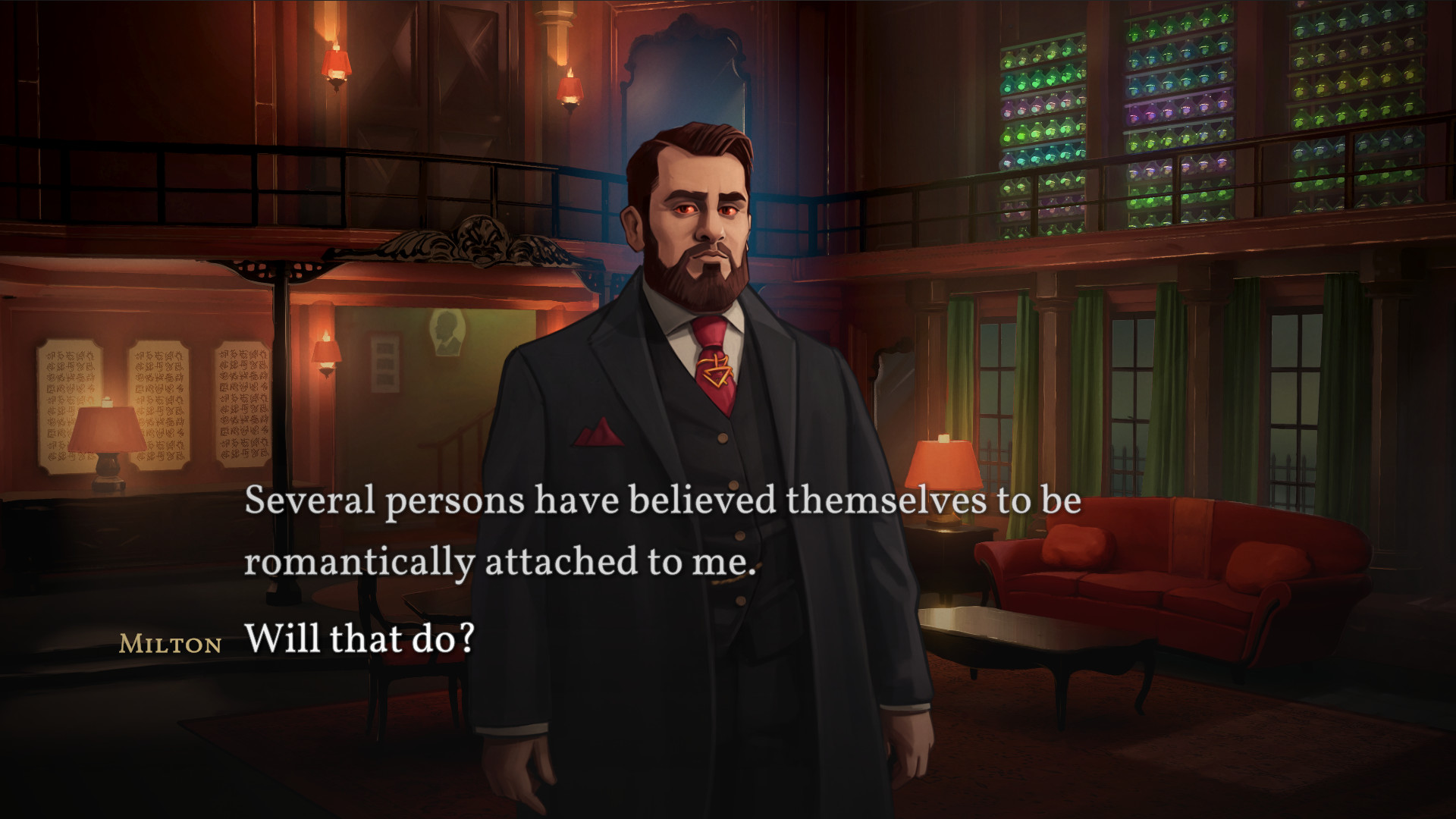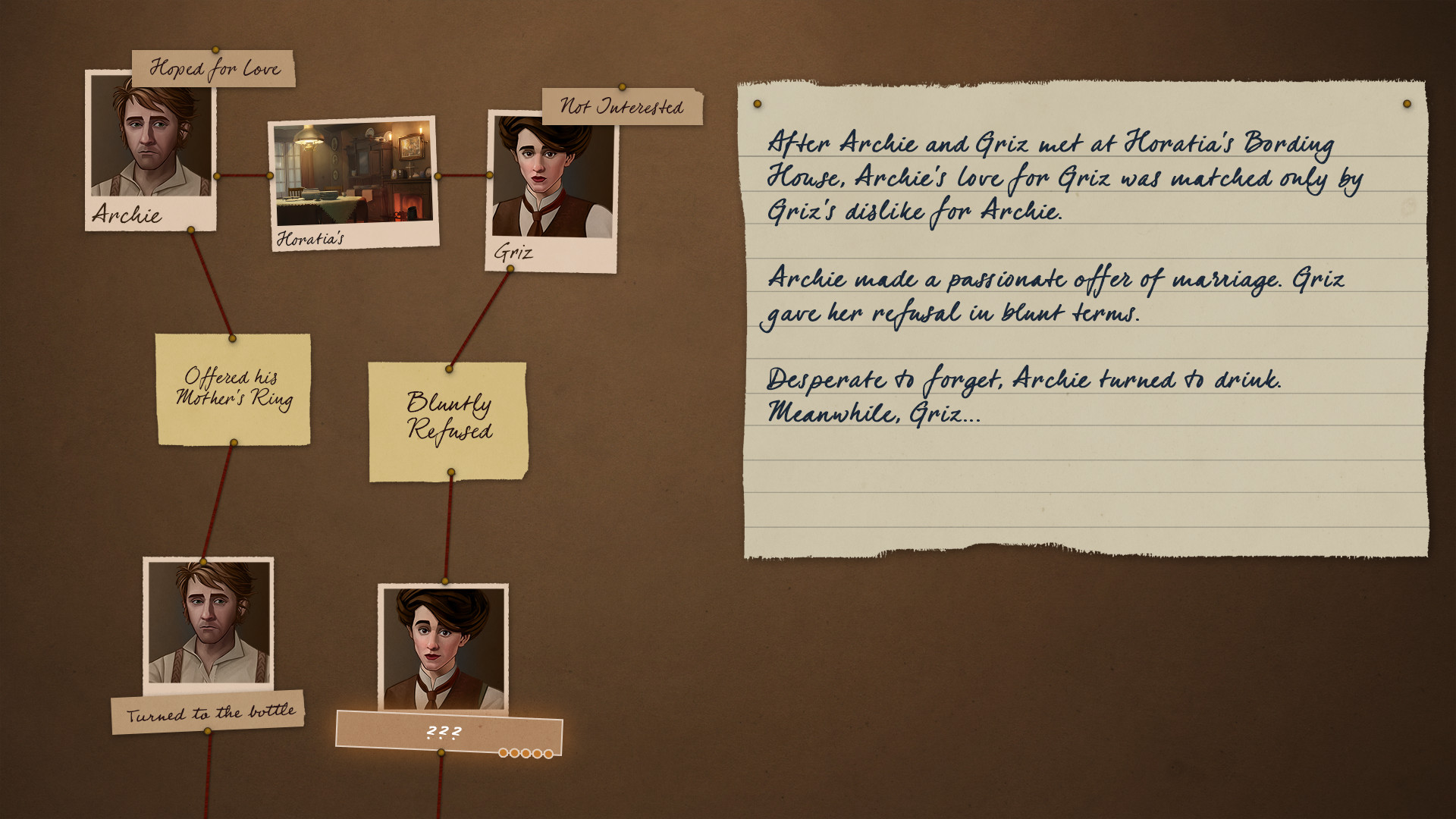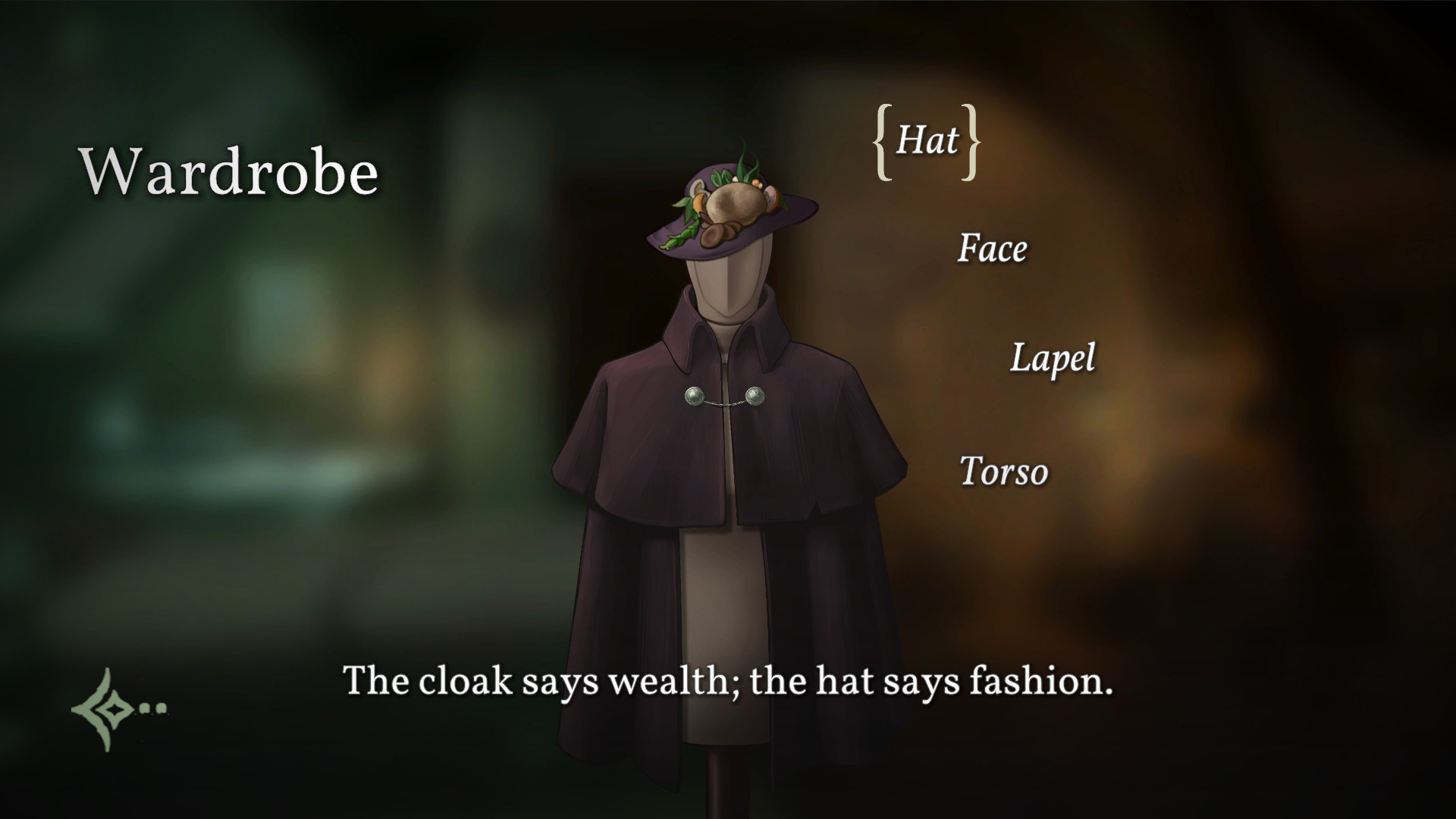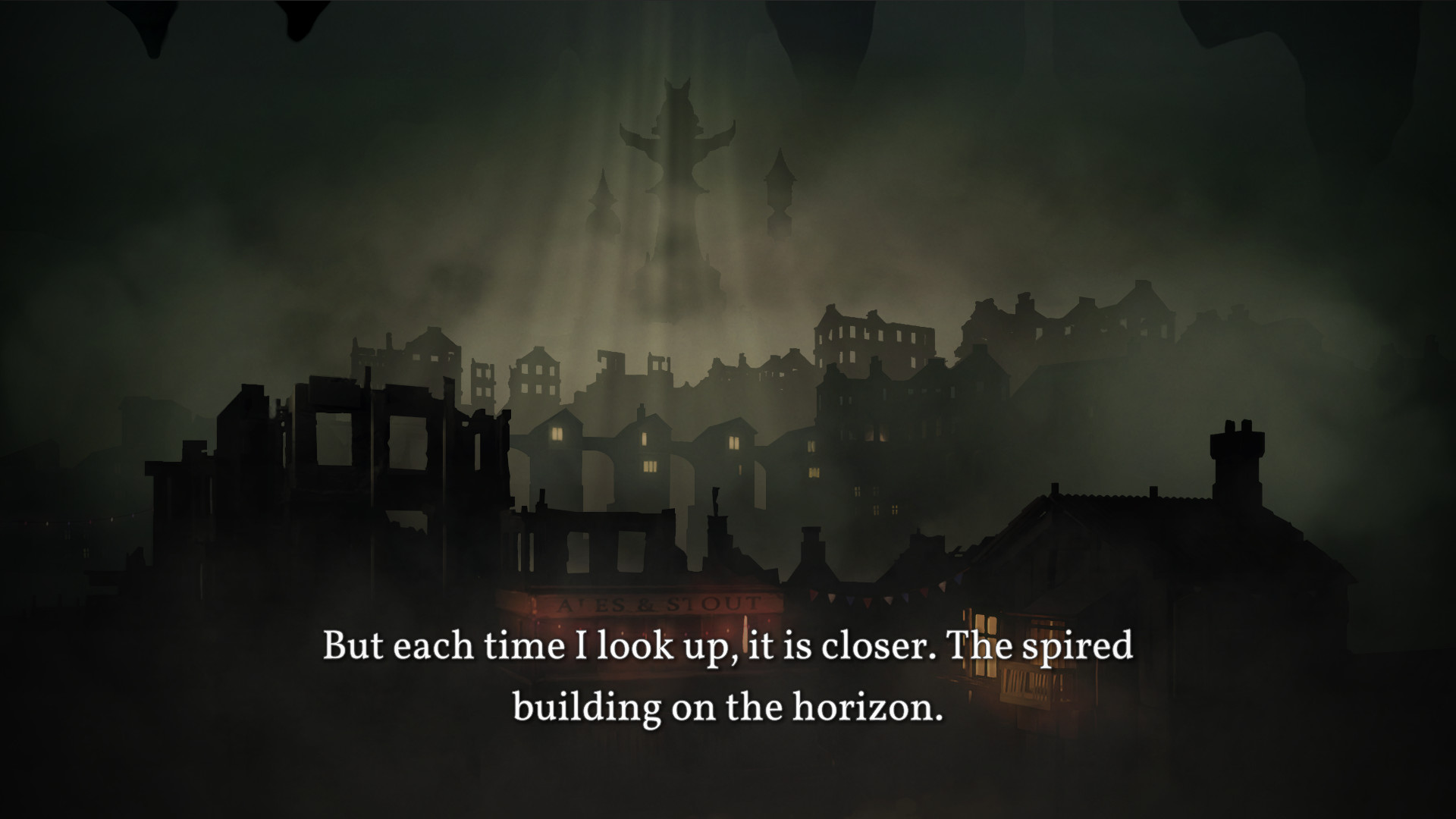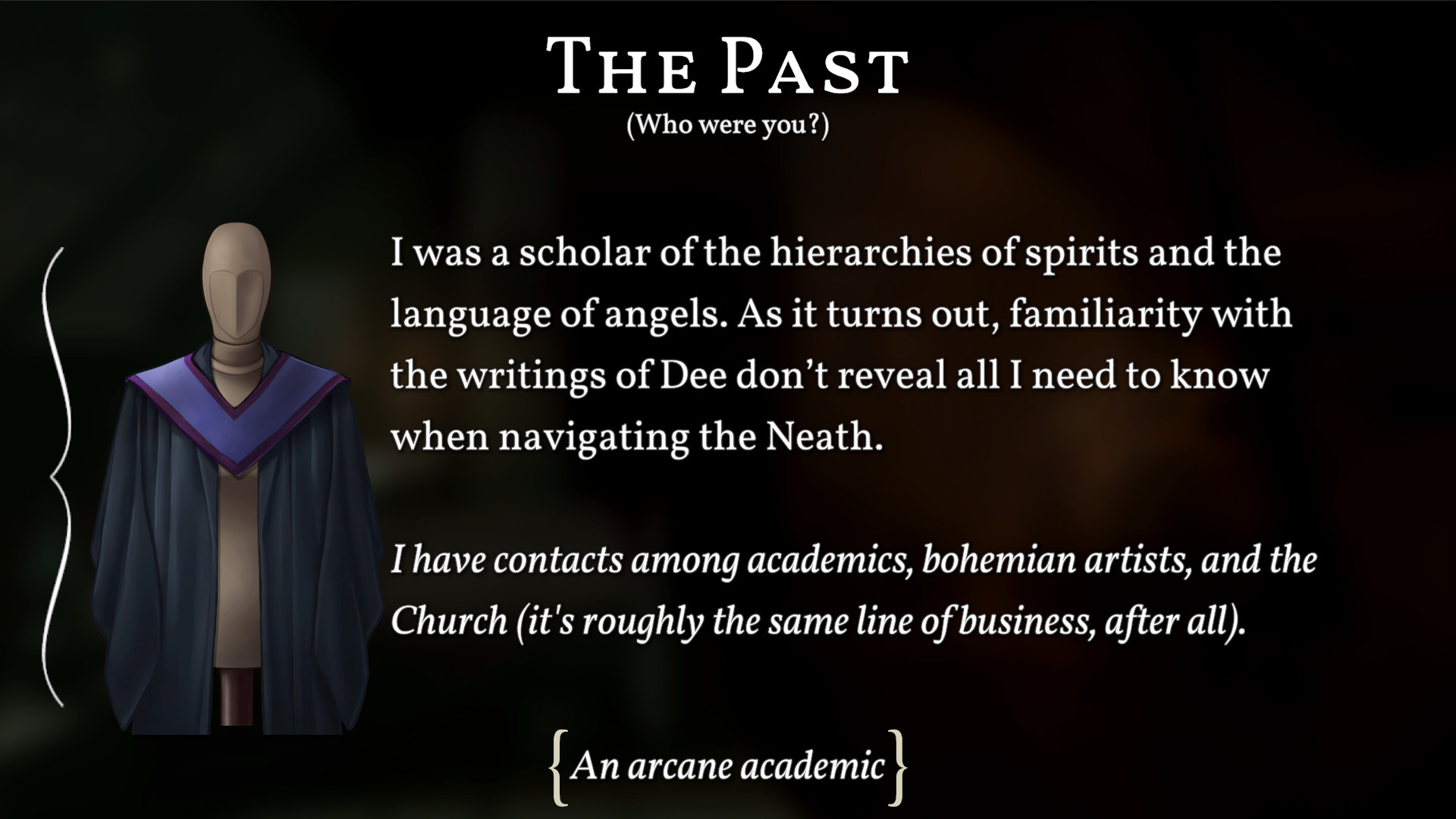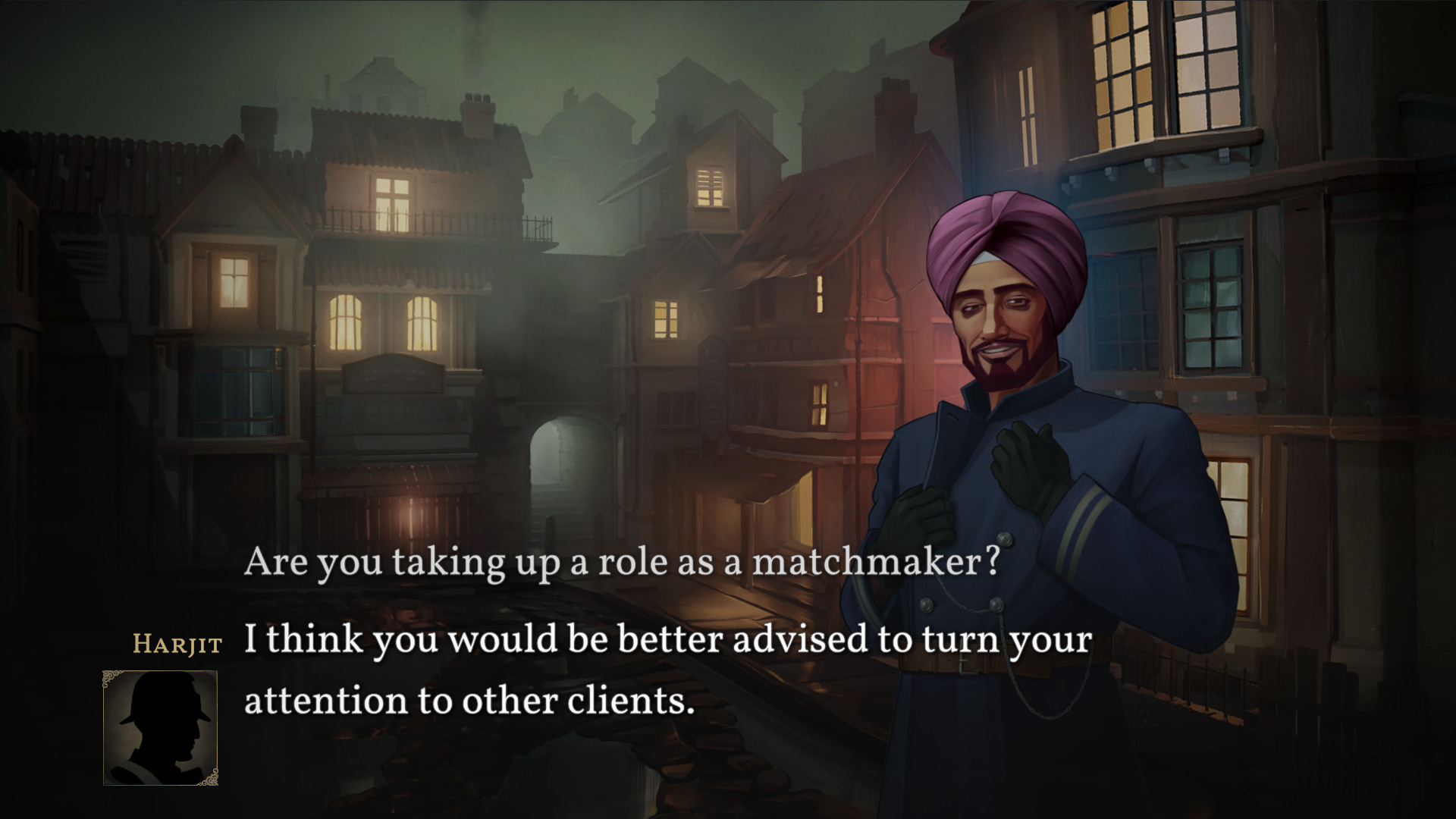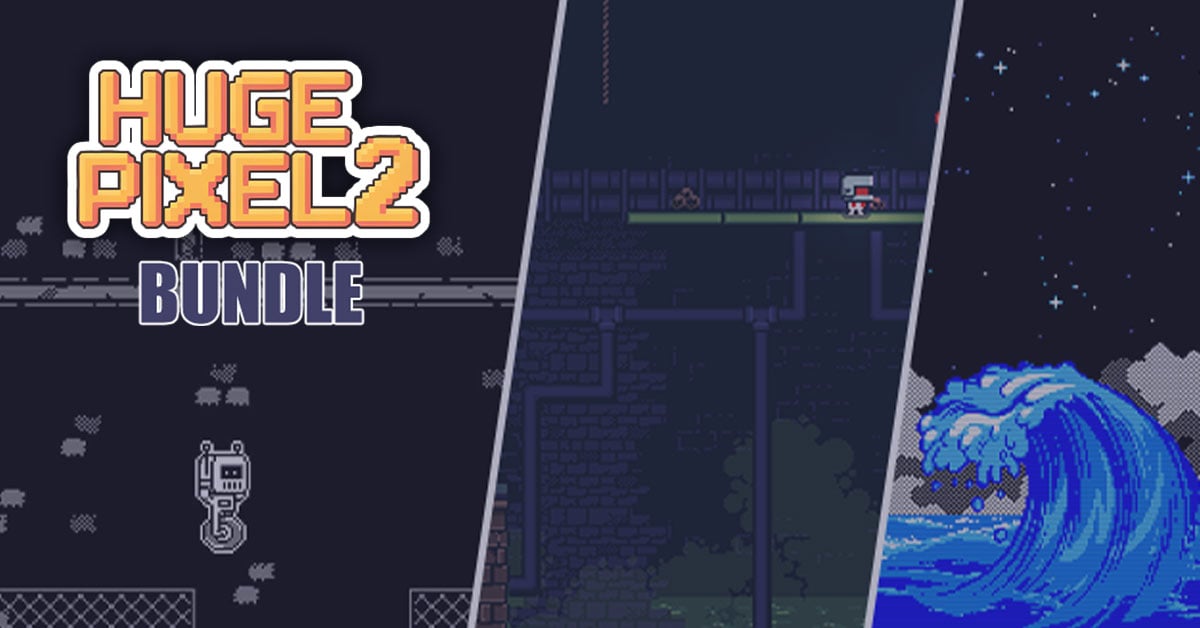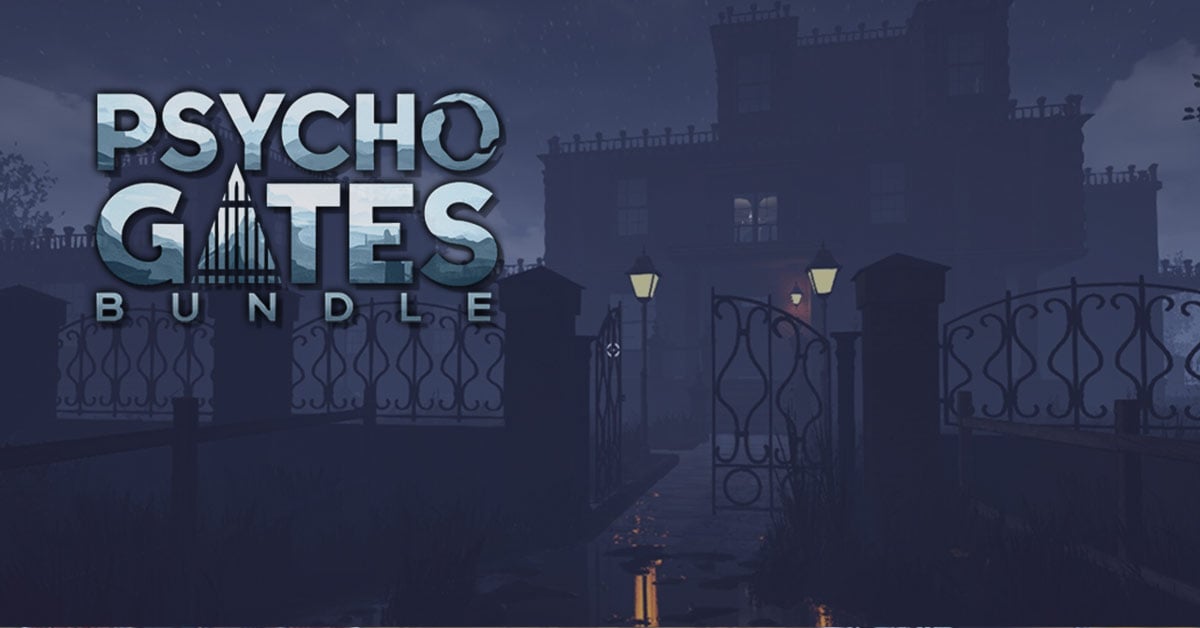
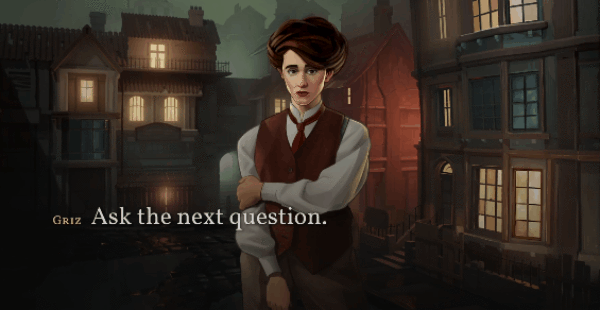
Welcome to Fallen London: a darkly hilarious gothic underworld where death is a temporary inconvenience, the rats talk, and Hell is only a stone's throw away.
Thanks to an unknown bargain, London now resides in a vast cavern under the earth. Down here, the sun doesn't shine, and Parliament has sunk into the Thames. Queen Victoria never emerges from her palace. Cats spy on their owners and whisper their secrets abroad. The fabric of strait-laced Victorian society has begun to fray.
New Masters are in charge. Why are they so… tall? And always cloaked? And why are they so interested in love stories?
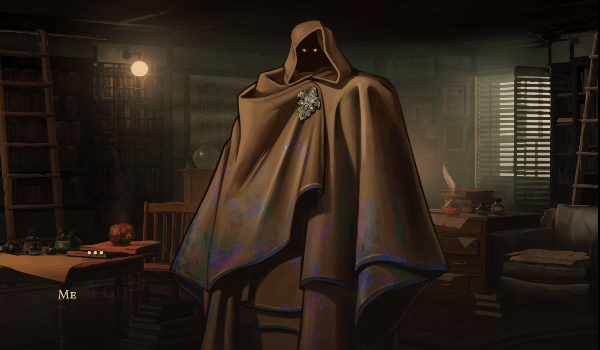
The possibilities for personal connection in London are different now. Thrown together in crisis, you might befriend or romance many of the characters you meet, from Griz, your assertive housemate for whom the Fall was a chance to break free of Victorian societal norms, to the infernally well-dressed gentleman at the Brass Consulate with the amber eyes.
Even death itself has a twist here: the first murder victim since the Fall is feeling much better, and keen to see justice done. Unfortunately, as the doctor who treated him immediately before he expired, your housemate Archie is the prime suspect...

- (Re)invent yourself: who were you before the Fall? Who will you be now?
- Create outfits from a selection of clothing and unusual accessories to unlock different story options
- Fall in love with a cast of diverse Londoners, each with their own secrets
- Matchmake among your friends, or seek love for yourself (by any definition you like)
- Write love stories in a delightful minigame, and use them to impress the new Masters
- Pick up odd jobs to earn money and gather resources. How are you at rat catching?
- Solve the first murder since the Fall, with the assistance of the victim
- Discover cosy, mysterious and magnificent locations in a dark and delicious version of Victorian London
- Seek deeper and deeper secrets over multiple playthroughs

Will you be a brilliant matchmaker, connecting friends and rivals while remaining unattached? Or are you looking for lasting love? Perhaps you're open to whatever comes your way? Every major storyline is accessible regardless of whether your approach to love is romantic or platonic.
Use an elaborate, dynamic story-crafting system to create love stories – and murder theories. Are the twists in the tale not to your taste? Then change the motive, the location, even the victim, and see how the stories adapt!
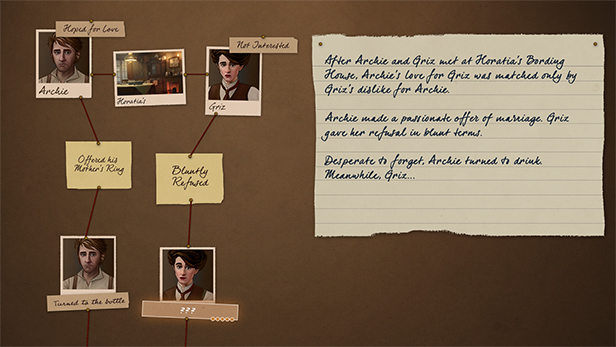

Your past will open different doors for you in London. What was your life on the Surface like? Were your family landed gentry? Or did they own a tailor’s shop, or dabble in the occult?
Your clothing will also make people think differently of you. Your outfits open new possibilities in conversation: be bolder, more commanding, more flirtatious. Ingratiate yourself with London's inhabitants by changing your style of dress – they won't be able to resist you in that hat!
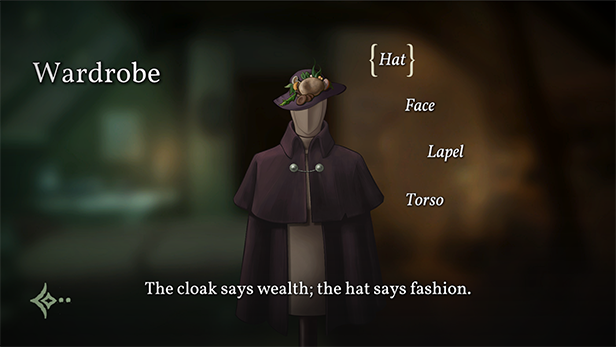
You'll also work odd jobs and collect resources which will open new avenues in social situations. Your housemate Griz has found you work as census-taker for those curious new Masters. Fill your census-taker's notebook with intimate details about your fellow citizens and you'll find you can pursue deeper relationships with them, romantic or otherwise.



Griz
For your fellow lodger Griz, the Fall of London has been a liberation – the chance to throw off her corsets, dump the dresses and be taken seriously in a position that would have been forbidden to her when she was 'Miss Griselda'.
Archie
For your other housemate Archie, the change is terrifying. What is a medical student supposed to believe in when even the laws of death no longer apply?
Harjit
When the Fall struck, Harjit stepped up to help anyone who needed it. Now he’s settling into his role as a man in uniform, but the territory is unfamiliar – and, secretly, he has a missing person of his own to find.
Milton
Milton is the amber-eyed host of a literary parlour with a scalding handshake and a prior address in Hell. He’s an excellent listener, but does he only want you for your soul?
Rachel
Rachel was halfway through her serialised novel when London fell and everything she was writing about was turned upside-down. Her publisher grows impatient. Fortunately (?) meeting Milton has rekindled her passion – for more than just writing.
David
Rachel’s brother, and no fan of Milton, David is also destined to be Fallen London’s first murder victim. When he returns from the dead, you can ask him all about it.
Horatia
For a decade, Horatia has taken in lodgers and turned them into family. Since London fell, people need the security she offers more than ever. So when a man made entirely of clay knocks at the door, offering to pay handsomely for lodgings, she can hardly refuse.
Mr Pages
One of London's new, mysterious “Masters”, Mr Pages has embarked on the titanic endeavour of conducting London’s first post-Fall census! But why are its questions so concerned with the love-lives of London’s citizens? How do people declare their affection, in this fair city? How lasting are their attachments? Might a Londoner take an interest in a very tall, broad-shouldered, cloaked personage that leans towards the chiropterous, hypothetically speaking?
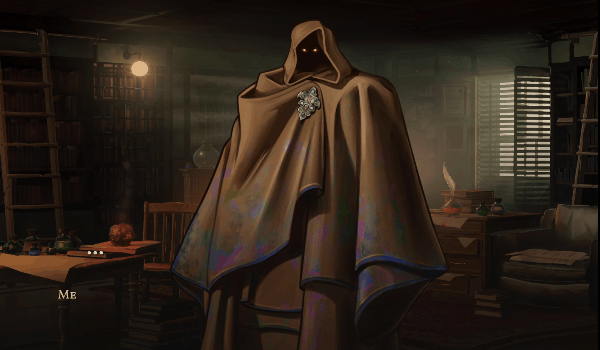

Explore this unique city in glorious, richly rendered 2D. Experience London through three seasons: the season of Confessions, the season of Yule, and the season of Love. Help establish the first Feast of the Rose, a festival of romance that will be celebrated in London for decades to come!
For players of Sunless Sea and Sunless Skies, Mask of the Rose offers a chance to immerse yourselves in the city that founded this deep, dark, and marvellous universe. And for veteran players of the Fallen London browser game, it marks your first opportunity to visit the city just after it fell. But fear not: Mask of the Rose is an excellent introduction to the universe we’ve been building for more than a decade, and you don’t need to have played our other games first. Come on in. Most things won’t bite, unless you want them to.
Explore the locales, lives, and loves of an impossible city. Exchange bon-mots with devils. Investigate the first murder where the victim can testify at the murderer’s trial. Dive into the sunken ruins of poor drowned Parliament. And if you’re truly reckless, fall in love.
This month's devlog is from Mask of the Rose developer Samus Buadhachin.
Griz hoped for Archie's attention. She gave him a diamond stick-pin, one of her few possessions of value left from home. Archie, embarrassed by this largesse, disposed of the gift by dropping it off the side of London Bridge.
At the behest of one of the mysterious hooded figures that run London these days, I'm trying to write a love story. It isn't going entirely to plan.
The value of stories in creating or collecting them crops up time and again in Failbetter games: from a side activity in the Fallen London early game to the career-spanning Ambitions in Sunless Sea and Sunless Skies. In Mask of the Rose, we've finally made it possible to read the stories that you write. As you play through Mask, other characters will come to you looking for help with stories of one sort or another: Harjit, the local constable, has crimes to solve; Rachel, a novelist, is struggling with a case of post-diluvian writer's block; other, stranger characters have other, stranger concerns. Taking on and fulfilling these commissions brings you into contact with storycrafting, Mask's innovative storytelling sandbox.
Storycrafting is a fairly simple idea (like many simple ideas, it conceals a great deal of complexity). Given a prompt say, "Tell a story of a Londoner attracted to a denizen of the Neath" and a set of empty slots arranged in a stylised version of the classic cork-and-red-string murderboard, your task is to fill those slots with characters, motivations, and actions that form the outline of a story that satisfies the prompt. The twist (of course there's a twist) is that, as you do so, your choices are fed into a vast expansion-grammar engine similar in principle to the outfit-description system we blogged about back in March, but on a significantly grander scale that takes your choices and weaves the story itself around them. As you make changes to the board on the left-hand side of the screen, the story you're creating updates itself on the right, in sometimes surprising ways.

The arrangement of slots on the board is constant between commissions: each story has a protagonist and a deuteragonist; each follows a kind of three-act structure. The people and ideas you can fit into these slots, though, vary both with the particular commission and your progress through Mask's storyline. You'll start with some available you already know the residents of Horatia's boarding house, for example, and your chosen background may give you other insights and learn others through gameplay. Discover a plausible motivation for a character and that motivation becomes available for use on the board.

Of course, not all motives and actions are plausible for every character. Anyone (almost) can fall in love, but not every character can scheme to steal your soul at the same time. Part of the challenge of storycrafting is finding a set of ideas that make internally consistent sense, and the game enforces this. Pick a motive that's inconsistent with a character you've already chosen, and the game will require you to choose another character (or another motive).
In this respect, storycrafting shares a lot of its DNA with solving a sudoku puzzle. Just as a sudoku solution is constrained by certain rules ("digits must not be repeated in a column"), so is a storycrafting commission ("Virginia cannot plausibly be motivated by a sense of simple decency"). At a sufficiently abstract remove, the task is the same: fill empty spaces in a way that satisfies a set of rules.

But where a (well-formed) sudoku has a single solution, storycrafting commissions are designed quite differently. We've gone to some lengths to ensure first that a given commission can be completed with a very large number of possible ideas, and then that the story generator can handle whatever combinations of character and motive you throw at it. A large part of the fun of storycrafting, we've found in internal testing, is throwing together unlikely combinations of ideas, and seeing how the story warps itself to accommodate them. A closer antecedent than sudoku in fact, one of the reference points when we were designing the storycrafting systems is something like Oskar Stlberg's wonderful Townscaper, where each block of the city you construct subtly changes its shape to respond to changes in neighbouring blocks.
[This isn't a technical blog, so I'll note in a very brief sidebar that all three of these things are still fundamentally the same thing: constraint networks at different points on a continuum of solution-space size. If you have a certain kind of computer-science background in which case, my condolences then this will likely have already jumped out at you as obvious.]
The fictional rewards for fulfilling a storycrafting commission vary. You (usually) get paid to do so, of course: always a strong motivation for writers in the Neath and otherwise. Helping other characters here can benefit you in other, less obvious ways, though: you may end up owed a favour in high places, or be able to use a particularly compelling story to influence events down the line. So it's not just an engaging mechanic in its own right; it's integrated into the broader story in a way that gives it some real stakes.
Storycrafting is quite a hefty feature in Mask about a sixth of the codebase by weight, the last time we checked because, in a way, it's doing two things at once. If yours is a puzzle-oriented kind of brain, you'll hopefully enjoy the process of teasing out the underlying rules that determine what makes a valid storycrafting commission. On the other hand, if what you've been looking for is a kind of interactive fanfic generator, we may have what you've been looking for. Either way, I hope you enjoy it!

Minimum Setup
- OS: Ubuntu 20.04+. ArchLinux
- Processor: Intel Pentium 2GHZ or AMD equivalentMemory: 4 GB RAM
- Memory: 4 GB RAM
- Graphics: OpenGL 3.2+. Vulkan capable
- Storage: <8 GB available space
[ 6383 ]
[ 5876 ]
[ 1265 ]
[ 2018 ]
[ 986 ]

